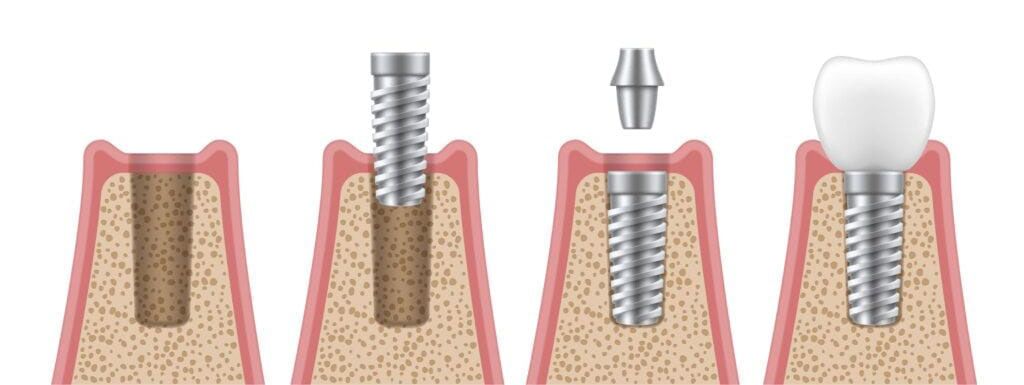If you are missing teeth, you may be wondering if dental implants are a good option for you. Dental implants are a tooth replacement option that is growing in popularity because they offer many benefits over other options like dentures or bridges. One of the main concerns people have about dental implants is whether or not they are painful. In this blog post, we will answer that question and discuss all aspects of implant pain so that you can make an informed decision about whether or not dental implants are right for you.
What are dental implants?
Dental implants are metal posts or frames that are surgically placed into the jawbone under the gums. Once in place, they act as a foundation for artificial teeth. Dental implants are considered to be a permanent solution for missing teeth because they fuse with the bone and become sturdy over time.
Are dental implants painful?
In order to answer this question, we need to break it down into three parts: the implant surgery, the post-operative recovery, and the long-term use of dental implants.
Implant Surgery
Many people worry that the implant surgery itself is painful, however this is not the case. During the implant surgery, you will be given local anesthesia to numb the surgical area in your mouth. This means you will not feel any pain. In some cases, your dentist may also recommend sedation to help you relax or to put you into a light sleep. This is usually given in the form of IV sedation or general anesthesia. The type of sedation used will depend on your individual case and will be discussed with you before the procedure.
After the area is numb, the dentist makes a small incision in the gum to expose the bone. A hole is then drilled into the bone and the implant is inserted. The gums are then sutured closed. The whole procedure usually takes less than an hour. In some cases, tooth extractions may also be performed and the procedure may take over an hour.

Post-Operative Recovery
After the implant surgery, you can expect some soreness and pain in the surgical area. This is normal and can be managed with over-the-counter pain medication like ibuprofen. In some cases, your dentist may prescribe a stronger pain medication. Oftentimes pain after dental implant surgery only lasts for a few days and many people report it being less painful than they expected.
Most people report minimal pain after the surgery, although you may also experience some swelling and bruising. In most cases, this should subside within a week or two. You can manage swelling by applying ice to the area for 20 minutes at a time, several times a day.
It is important to take it easy after the surgery and not to do any strenuous activity. You should also avoid drinking alcohol or using a straw for the first few days. Doing any of the aforementioned activities can make your pain worse.
Long-Term Use of Dental Implants
Once the implant has healed and the artificial tooth is placed on top, you can expect your dental implant to feel just like your natural teeth. There is no pain associated with long-term use of dental implants.
Pain: When to Call Your Dentist
While most people do not experience significant pain after the surgery, there are some cases where pain can be a sign of something more serious. If you experience any of the following, you should call your dentist:
- Severe pain that is not alleviated by over-the-counter medication
- Swelling that continues to increase
- A fever
- Increasing redness or pus around the surgical site
- Pain that lasts longer than two weeks after surgery
If you experience any of these symptoms, it could be a sign of a complication following surgery. While dental implants have a success rate of above 95%, there is still a small chance of complications, including:
Incision Line Opening

One of the most common complications of dental implant surgery is when the tissue around the implant reopens after surgery. When the incision reopens, this can cause pain and irritation around the incision. In most cases, this can be treated by rinsing the mouth with a chlorhexidine rinse regularly and taking antibiotics to prevent infection. In some cases, additional treatment may be needed.
Infection
Infection is another complication that can occur after dental implant surgery. Infection can cause pain, swelling, and redness around the implant site. In some cases, it may also cause fever. If you think you might have an infection, it is important to call your dentist right away so that they can start you on antibiotics.
Failed Implant
In very rare cases, the implant may fail to integrate with the bone or it may have shifted slightly. This can happen if the implant is placed in an area with poor blood supply or if there is extensive bone loss. If this happens, the implant will need to be removed and the process started again from the beginning.
Peri-Implant Disease
Peri-implant disease is an infection of the tissue around the implant caused by a buildup of plaque and bacteria. This can cause pain, swelling, and redness around the implant. In some cases, it can also cause the jawbone around the implant to deteriorate. If you think you might have peri-implant disease, it is important to call your dentist right away so that they can start you on the necessary treatment.
In Conclusion
In this blog, we addressed the question “are dental implants painful?” We started by defining dental implants and explaining how they work. We then explained the dental implant surgical procedure, as well as what to expect in terms of pain during recovery. Finally we discussed when pain warrants a call to your dentist.
In conclusion, we can see that there is some pain associated with dental implants, but it is manageable and temporary. Overall, dental implants are a great option for people missing one or more teeth. If you have any further questions about implant pain or the implant surgery itself, please contact your dentist. They will be more than happy to answer any of your questions and help you make the best decision for your smile. Thank you for reading!

